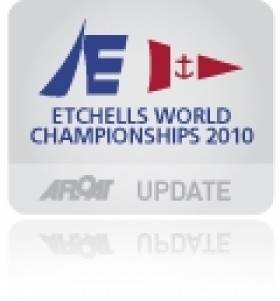Displaying items by tag: Australian sailors dominate
Bertrand maintains hold on Etchells Worlds
John Bertrand's dominance of the Etchells World Championships at Howth Yacht Club continued on day 4 of the regatta with a win in the afternoon race after scoring a disappointing 9th earlier in the day. His lead, however, has been trimmed back by his main rival Ante Razmilovic whose 4th and 5th places have closed the gap to 7 points after discards The other Razmilovic – Nils – had mixed fortunes on the day and lies third overall, a further seven points adrift.
The Championship, sponsored by the local Fingal County Council, has three more races on the schedule, two on Friday and one on Saturday, with only one discard allowed for the 9-race series, underlining the need for consistency at this level. Four wins in six races by Bertrand is undoubtedly exceptional consistency!
The 42-boat fleet faced a freshening north-easterly for the start of Race 5, sailing in18 knots of wind and a choppy sea. Nils Razmilovic of the Royal Swedish YC (sailing for Singapore) enjoyed the conditions to lead from the first windward mark to the finish. He was followed at various stages by his brother Ante, Eamonn O'Nolan of the RORC, Jake Gunther of Royal Brighton YC and Julia Bailey of Royal Thames YC.
Somewhat surprisingly, series leader John Bertrand could not keep with the pace and indeed slipped from 5th to finish 9th, a disappointing result by his standards and one which he will no doubt hope to be his discard. Despite that setback, he still held a 6-point lead in the overall standings after the fifth race.
It was a good day for the British contingent, filling the next three places, with O'Nolan securing his best placing in 2nd spot and Julia Bailey taking a well-earned third while Ante Razmilovic's 4th was enough to retain 2nd overall, tied on points with his brother.
As if to exorcise the ghosts of his 9th place in the previous race, Bertrand got back to winning ways in the sixth race to extend his overall lead, although he left it late. He was behind the ever-improving Julia Bailey at each mark rounding but on the final beat – shortened earlier because of dropping wind strength – he pulled ahead of the Royal Thames helm by the finish.
Damien King of Australia, never out of the top three throughout the race, held on to that slot, with Eamonn O'Nolan completing a satisfying day with a 4th to add to his earlier 2nd. Ante Razmilovic had to settle for 5th while 6th for Marvin Beckmann of Houston represented the equal best American result in the series so far.
For the Burrows family – Richard on helm with son David and daughter Samantha crewing - seventh was an encouraging result, maintaining their 11th place on the leader-board and consolidating their position as the leading Irish boat.
Etchells World Championships – overall placings after 6 races:
John Bertrand (Australia) - 9 points Ante Razmilovic (Britain) – 16 points Nils Razmilovic (Singapore) – 23 points Damien King (Australia) – 24 points Jake Gunther (Australia) – 25 points Graham Bailey (Britain) – 36 points
Follow the event on Twitter on the Championship website – www.etchellsworlds2010.org





























































